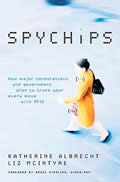Other
McIntyre
Articles:
RFID Vulnerable to Virus Attacks
SENATE BANKING COMMITTEE MEMBER DENOUNCES "NO-SWIPE" CREDIT CARDS
By Liz McIntyre & Katherine Albrecht
December
8, 2006
NewsWithViews.com
A member of the Senate Banking Committee denounced RFID "no-swipe" credit cards at a press conference Sunday. Senator Charles Schumer (D-NY) said contracts for the cards should have warning boxes disclosing "the known weaknesses of the technology." He cautioned cardholders about their vulnerability to identity thieves, commenting you "may as well put your credit card information on a big sign on your back."
"No-swipe" or "contactless" credit cards contain RFID microchips that communicate account information silently and invisibly by radio waves. These microchips have earned the nickname "spychips" because the information they contain can be read without an individual's knowledge or consent.
While Congress is just waking up to the dangers of RFID technology, privacy and civil liberties organizations like CASPIAN have been sounding the alarm for years.
"It's about time for Capitol Hill to recognize the dangers of RFID," said Dr. Katherine Albrecht, Founder and Director of CASPIAN (Consumers Against Supermarket Privacy Invasion and Numbering). "Perhaps now members of Congress will listen to their concerned constituents and work to pass long overdue bipartisan RFID labeling legislation not only for credit cards, but other RFID-tagged consumer items as well."
CASPIAN has had model RFID labeling legislation titled "The RFID Right to Know Act" available to federal lawmakers since 2003. (See http://www.spychips.com/right-to-know-bill.html.) The legislation was authored by by Zoe Davidson of the Boston University Legislative Clinic.
While CASPIAN supports free-market solutions to the problems of privacy invading technologies like RFID, the group believes consumer notice is needed so the free market can work. "We believe consumers have a right to know when the things they wear, carry, and interact with contain tracking devices--especially credit cards that can leak sensitive personal information," said Liz McIntyre, CASPIAN's communications director.
McIntyre, a former federal bank examiner, points out that vulnerable "swipeless" technology not only poses a threat to customers, but to the financial institutions that have issued millions of contactless cards, as well. "What excuse will organizations like JP Morgan Chase make if consumers are harmed financially because they have their personal information siphoned by identity thieves? These issuers stand to lose millions of dollars."
CASPIAN demanded a recall of RFID credit cards last month after the New York Times reported that a team of security researchers found that virtually every one of the "no-swipe" credit cards it tested was vulnerable to unauthorized charges and put consumers at risk for identity theft.
Researchers demonstrated how thieves could secretly skim information from the cards, right through purses, backpacks and wallets. The data included the cardholder's name, credit card number, expiration date and other information that could be used to make unauthorized purchases.
Albrecht and McIntyre are offering to testify before Congress about their extensive research into the dangers posed by RFID, and to send a copy of their book "Spychips: How Major Corporations and Government Plan to Track Your Every Purchase and Watch Your Every Move" (Penguin/Plume Oct. 2006) to interested federal legislators.
� 2006 - Liz McIntyre & Katherine Albrecht - All Rights Reserved
Sign Up For Free E-Mail Alerts
E-Mails are used strictly for NWVs alerts, not for sale
Liz McIntyre is a consumer privacy expert and author of Spychips: How Major Corporations and Government Plan to Track your Every Move with RFID. In this explosive book, McIntyre and co-author Katherine Albrecht reveal how organizations like Procter & Gamble, Gillette, Wal-Mart, and even the U.S. Postal Service plan to use tiny computer chips smaller than a grain of sand to track everyday objects-and even people-keeping tabs on everything you own and everywhere you go.
Katherine Albrecht is a privacy advocate and co-author of Spychips: How Major Corporations and Government Plan to Track your Every Move with RFID. Albrecht has testified on RFID technology before the Federal Trade Commission, the California state legislature, the European Commission, and the Federal Reserve Bank, and she has given over a thousand television, radio and print interviews to news outlets all over the world. Her efforts have been featured on CNN, NPR, the CBS Evening News, Business Week, and the London Times, to name just a few.
Web Sites: SpyChips.com and NoCards.org
E-Mail: liz@spychips.com
"No-swipe" or "contactless" credit cards contain RFID microchips that
communicate account information silently and invisibly by radio waves.
These microchips have earned the nickname "spychips"...














